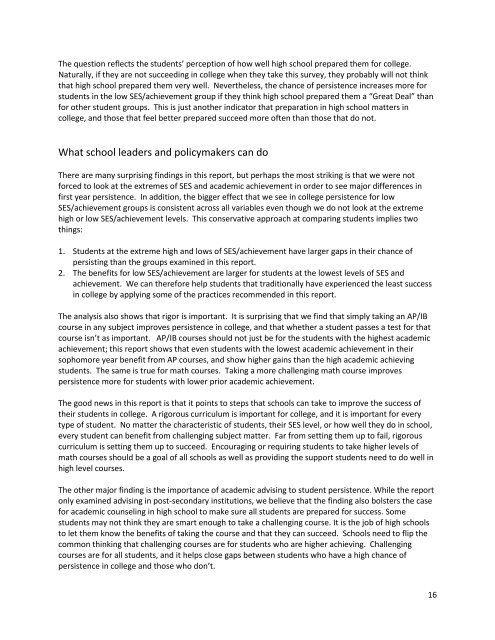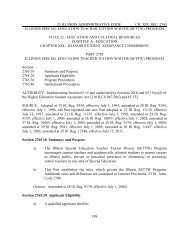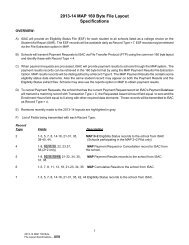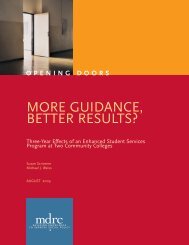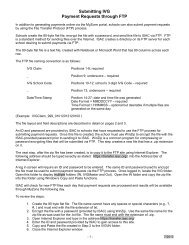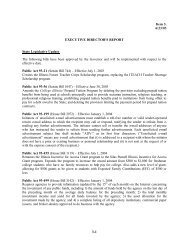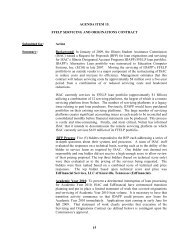High school rigor and good advice: Setting up students to succeed
High school rigor and good advice: Setting up students to succeed
High school rigor and good advice: Setting up students to succeed
You also want an ePaper? Increase the reach of your titles
YUMPU automatically turns print PDFs into web optimized ePapers that Google loves.
The question reflects the <strong>students</strong>’ perception of how well high <strong>school</strong> prepared them for college.<br />
Naturally, if they are not <strong>succeed</strong>ing in college when they take this survey, they probably will not think<br />
that high <strong>school</strong> prepared them very well. Nevertheless, the chance of persistence increases more for<br />
<strong>students</strong> in the low SES/achievement gro<strong>up</strong> if they think high <strong>school</strong> prepared them a “Great Deal” than<br />
for other student gro<strong>up</strong>s. This is just another indica<strong>to</strong>r that preparation in high <strong>school</strong> matters in<br />
college, <strong>and</strong> those that feel better prepared <strong>succeed</strong> more often than those that do not.<br />
What <strong>school</strong> leaders <strong>and</strong> policymakers can do<br />
There are many surprising findings in this report, but perhaps the most striking is that we were not<br />
forced <strong>to</strong> look at the extremes of SES <strong>and</strong> academic achievement in order <strong>to</strong> see major differences in<br />
first year persistence. In addition, the bigger effect that we see in college persistence for low<br />
SES/achievement gro<strong>up</strong>s is consistent across all variables even though we do not look at the extreme<br />
high or low SES/achievement levels. This conservative approach at comparing <strong>students</strong> implies two<br />
things:<br />
1. Students at the extreme high <strong>and</strong> lows of SES/achievement have larger gaps in their chance of<br />
persisting than the gro<strong>up</strong>s examined in this report.<br />
2. The benefits for low SES/achievement are larger for <strong>students</strong> at the lowest levels of SES <strong>and</strong><br />
achievement. We can therefore help <strong>students</strong> that traditionally have experienced the least success<br />
in college by applying some of the practices recommended in this report.<br />
The analysis also shows that <strong>rigor</strong> is important. It is surprising that we find that simply taking an AP/IB<br />
course in any subject improves persistence in college, <strong>and</strong> that whether a student passes a test for that<br />
course isn’t as important. AP/IB courses should not just be for the <strong>students</strong> with the highest academic<br />
achievement; this report shows that even <strong>students</strong> with the lowest academic achievement in their<br />
sophomore year benefit from AP courses, <strong>and</strong> show higher gains than the high academic achieving<br />
<strong>students</strong>. The same is true for math courses. Taking a more challenging math course improves<br />
persistence more for <strong>students</strong> with lower prior academic achievement.<br />
The <strong>good</strong> news in this report is that it points <strong>to</strong> steps that <strong>school</strong>s can take <strong>to</strong> improve the success of<br />
their <strong>students</strong> in college. A <strong>rigor</strong>ous curriculum is important for college, <strong>and</strong> it is important for every<br />
type of student. No matter the characteristic of <strong>students</strong>, their SES level, or how well they do in <strong>school</strong>,<br />
every student can benefit from challenging subject matter. Far from setting them <strong>up</strong> <strong>to</strong> fail, <strong>rigor</strong>ous<br />
curriculum is setting them <strong>up</strong> <strong>to</strong> <strong>succeed</strong>. Encouraging or requiring <strong>students</strong> <strong>to</strong> take higher levels of<br />
math courses should be a goal of all <strong>school</strong>s as well as providing the s<strong>up</strong>port <strong>students</strong> need <strong>to</strong> do well in<br />
high level courses.<br />
The other major finding is the importance of academic advising <strong>to</strong> student persistence. While the report<br />
only examined advising in post-secondary institutions, we believe that the finding also bolsters the case<br />
for academic counseling in high <strong>school</strong> <strong>to</strong> make sure all <strong>students</strong> are prepared for success. Some<br />
<strong>students</strong> may not think they are smart enough <strong>to</strong> take a challenging course. It is the job of high <strong>school</strong>s<br />
<strong>to</strong> let them know the benefits of taking the course <strong>and</strong> that they can <strong>succeed</strong>. Schools need <strong>to</strong> flip the<br />
common thinking that challenging courses are for <strong>students</strong> who are higher achieving. Challenging<br />
courses are for all <strong>students</strong>, <strong>and</strong> it helps close gaps between <strong>students</strong> who have a high chance of<br />
persistence in college <strong>and</strong> those who don’t.<br />
16


